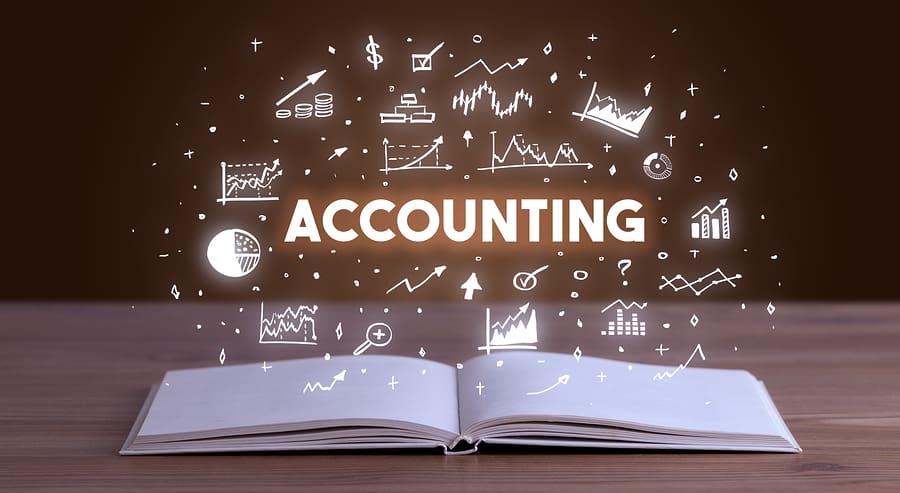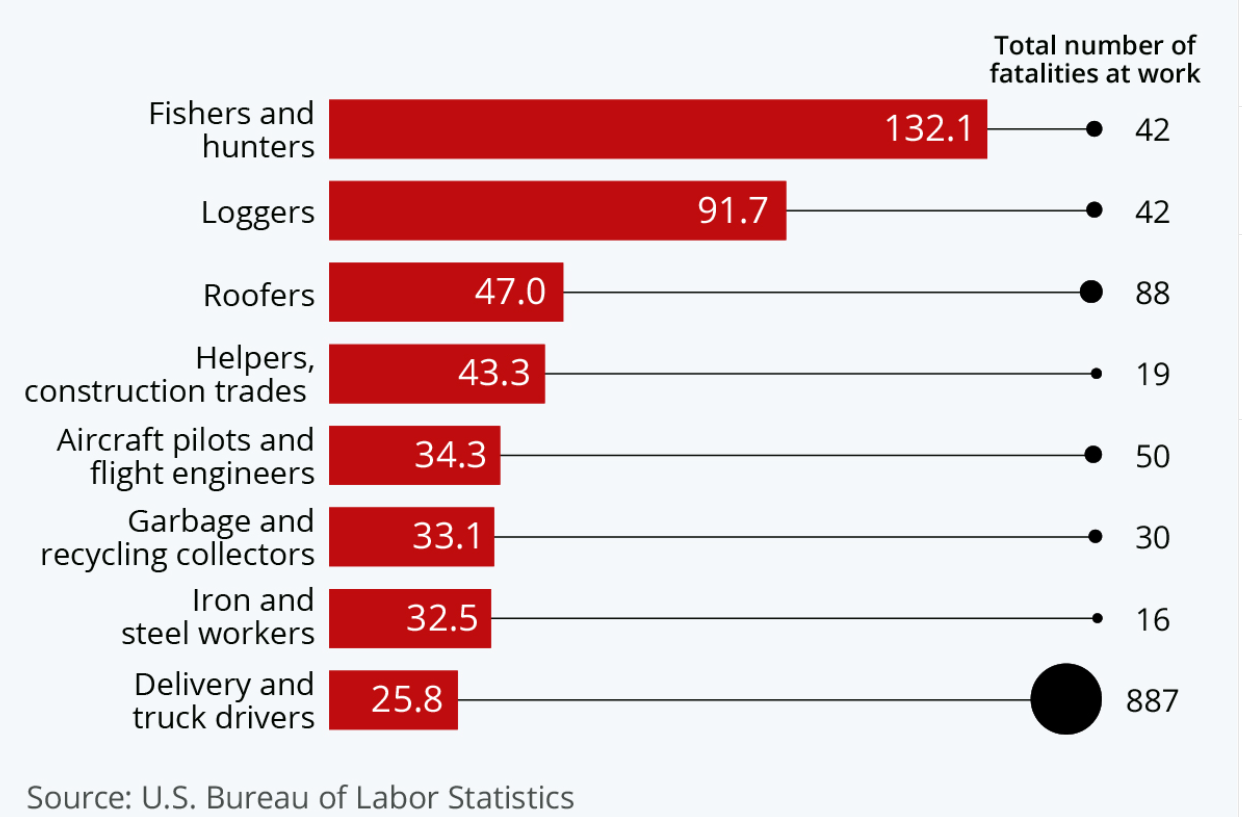Discover Top 5+ Most Boring and Exciting Jobs In The World
 |
| Discover Top 5+ Most “Boring” And Exciting Jobs In The World |
Financial jobs may often be lucrative — but some of them could make you seem boring and even incompetent to the people around you, according to a new study.
Researchers from the University of Essex in Colchester, England, asked more than 500 people across five different experiments about the careers and hobbies they considered the most “boring” — and what characteristics they associated with people who did those jobs. The study was published in the Personality and Social Psychology Bulletin earlier this month.
Finance was overwhelmingly tagged as the world’s most boring industry, with finance-associated positions occupying four of the top five slots on the “most boring” list. The people occupying those “boring” jobs were also not seen as competent, according to the report, which surprised at least one of the study’s authors.
Take a look at these most boring and exciting jobs you can find in the world.
List of top 5 most boring jobs
1. Data analysis
2. Accounting
3. Tax/insurance work
4. Cleaning
5. Banking
1. Data analysisWhat are the most boring jobs in the world?
 |
| Photo: 200LAB Education |
Although many groups, organizations, and experts have different ways to approach data analysis, most of them can be distilled into a one-size-fits-all definition. Data analysis is the process of cleaning, changing, and processing raw data, and extracting actionable, relevant information that helps businesses make informed decisions. The procedure helps reduce the risks inherent in decision-making by providing useful insights and statistics, often presented in charts, images, tables, and graphs.
What Is the Data Analysis Process?
Answering the question “what is data analysis” is only the first step. Now we will look at how it’s performed. The data analysis process, or alternately, data analysis steps, involves gathering all the information, processing it, exploring the data, and using it to find patterns and other insights. The process consists of:
- Data Requirement Gathering: Ask yourself why you’re doing this analysis, what type of data analysis you want to use, and what data you are planning on analyzing.
- Data Collection: Guided by the requirements you’ve identified, it’s time to collect the data from your sources. Sources include case studies, surveys, interviews, questionnaires, direct observation, and focus groups. Make sure to organize the collected data for analysis.
- Data Cleaning: Not all of the data you collect will be useful, so it’s time to clean it up. This process is where you remove white spaces, duplicate records, and basic errors. Data cleaning is mandatory before sending the information on for analysis.
- Data Analysis: Here is where you use data analysis software and other tools to help you interpret and understand the data and arrive at conclusions. Data analysis tools include Excel, Python, R, Looker, Rapid Miner, Chartio, Metabase, Redash, and Microsoft Power BI.
- Data Interpretation: Now that you have your results, you need to interpret them and come up with the best courses of action, based on your findings.
- Data Visualization: Data visualization is a fancy way of saying, “graphically show your information in a way that people can read and understand it.” You can use charts, graphs, maps, bullet points, or a host of other methods. Visualization helps you derive valuable insights by helping you compare datasets and observe relationships.
A huge part of a researcher’s job is to sift through data. That is literally the definition of “research.” However, today’s Information Age routinely produces a tidal wave of data, enough to overwhelm even the most dedicated researcher.
Data analysis, therefore, plays a key role in distilling this information into a more accurate and relevant form, making it easier for researchers to do to their job.
Data analysis also provides researchers with a vast selection of different tools, such as descriptive statistics, inferential analysis, and quantitative analysis.
So, to sum it up, data analysis offers researchers better data and better ways to analyze and study said data.
How much of a role does data cleansing play in your processes?
Cleaning data is a very important process because you need to recognize which data should stay and which should not. Including incorrect data while processing it might give you the wrong results, which in turn can lead to coming up with the wrong solutions. You then have to repeat your work, which is a waste of your time.
Is data analysis boring?
The most boring person in the world is a data analyst who is religious, likes watching TV and lives in a town, a peer-reviewed study found. Researchers have revealed society's dullest jobs and hobbies - as well as those deemed the most exciting.
Lucrative professions are seen to be among the most mundane - with data analysis, accounting, insurance, and banking topping the list, according to the study. It also found that watching TV and having an interest in maths are among the dullest hobbies.
What are a data analyst’s responsibilities?
- Gathering data
- Cleaning data
- Processing data
- Producing reports
- Spotting patterns
- Collaborating with others and setting up infrastructure
2. Accounting
 |
| Photo: Bigstock |
Accounting is the recording of financial transactions along with storing, sorting, retrieving, summarizing, and presenting the results in various reports and analyses. Accounting is also a field of study and profession dedicated to carrying out those tasks.
One part of accounting focuses on presenting the financial information in the form of general-purpose financial statements (balance sheet, income statement, etc.) that are distributed to people outside of the company. These external reports must be prepared in accordance with generally accepted accounting principles often referred to as GAAP or US GAAP.
Another part of accounting focuses on providing a company's management with the information needed to keep the business financially healthy. Although some of the information comes from recorded transactions, many of the analyses and reports include estimated and projected amounts based on various assumptions. Generally, this information is not distributed to people outside of the company's management. A few examples of this information are budgets, standards for controlling operations, and estimating selling prices when quoting prices for new work.
Other Examples of Accounting
Some of the many other examples of accounting include:
- Advising on accounting systems
- Income tax planning, advising, and reporting
- Auditing the financial statements of companies and other organizations
- Providing general business advice
- Financial planning for individuals
Types of Accounting
Financial Accounting
Financial accounting refers to the processes used to generate interim and annual financial statements. The results of all financial transactions that occur during an accounting period are summarized into the balance sheet, income statement, and cash flow statement. The financial statements of most companies are audited annually by an external CPA firm. For some, such as publicly-traded companies, audits are a legal requirement.6 However, lenders also typically require the results of an external audit annually as part of their debt covenants. Therefore, most companies will have annual audits for one reason or another.
Managerial Accounting
Managerial accounting uses much of the same data as financial accounting, but it organizes and utilizes information in different ways. Namely, in managerial accounting, an accountant generates monthly or quarterly reports that a business's management team can use to make decisions about how the business operates. Managerial accounting also encompasses many other facets of accounting, including budgeting, forecasting, and various financial analysis tools. Essentially, any information that may be useful to management falls underneath this umbrella.
Cost Accounting
Just as managerial accounting helps businesses make decisions about management, cost accounting helps businesses make decisions about costing. Essentially, cost accounting considers all of the costs related to producing a product. Analysts, managers, business owners, and accountants use this information to determine what their products should cost. In cost accounting, money is cast as an economic factor in production, whereas in financial accounting, money is considered to be a measure of a company's economic performance.
Is Accounting a fun or boring job?
Whilst the role of the Accountant can be exciting, some aspects are not so great. This is the same for any job right?
The worst part of being an Accountant can vary depending on the type of accountant role.
For account clerk type roles the repetitive data entry can be boring and unsatisfying.
Clerical accounting work can be as exciting as watching grass grow.
For those in management accounting, it is the mad rush working long hours to complete month-end reporting which is seen as the worst part.
Accounting can be a very stressful job. The level of stress is dependant on several aspects.
Such as the culture of the organization, co-workers, and accounting roles and tasks.
Stress in accounting roles, normally stems from the number of deadlines, requiring long hours to be worked to produce reports for management, and a multitude of tasks to be performed by a certain date.
You do need to organize and be comfortable with numbers. If not this can be a cause of stress.
If you are comfortable with your role, comfortable with accounting methods, and numbers you are less likely to be stressed.
If there are gaps in your accounting knowledge or mathematics there are tons of online courses you can do.
3. Tax/insurance work
 |
| Photo: Progessive Online |
Insurance is a financial safety net, helping you and your loved ones recover after something bad happens — such as a fire, theft, lawsuit or car accident. When you purchase insurance, you’ll receive an insurance policy, which is a legal contract between you and your insurance provider. And when you suffer a loss that’s covered by your policy and file a claim, insurance pays you or a designated recipient, called a beneficiary, based on the terms of your policy.
The most difficult thing about insurance is that you’re paying for something you hope you never have to use. Nobody wants something bad to happen to them. But suffering a loss without insurance can put you in a difficult financial situation.
Insurance is an important financial tool. It can help you live life with fewer worries knowing you’ll receive financial assistance after a disaster or accident, helping you recover faster. When it comes to life insurance, this could mean your family doesn’t have to move out of the house or that your kids can afford to go to college. For auto insurance, it could mean you have extra cash in hand to help pay for repairs or a replacement vehicle after an accident. Insurance can help keep your life on track, as much as possible, after something bad derails it.
Your independent insurance agent is a great resource to learn more about the benefits of insurance, as well as the benefits in your specific insurance policy. For example, you may have access to perks such as free roadside assistance, risk control consulting for businesses or cash value in a life insurance policy, in addition to your insurance coverage.
And in some cases, like auto insurance and workers’ compensation, you may be required by law to have insurance in order to protect others.
How does insurance work?
Insurance is essentially a gigantic rainy day fund shared by many people (called policyholders) and managed by an insurance carrier. The insurance company uses money collected (called premium) from its policyholders and other investments to pay for its operations and to fulfill its promise to policyholders when they file a claim.
Because of the unpredictable nature of natural disasters — like tornadoes, hail, wildfires and hurricanes, and everyday disasters such as fender benders and kitchen fires — an insurance company’s main goal is to remain financially strong enough to handle anything that comes its policyholders’ way.
What are the benefits of insurance?
Insurance is an important financial tool. It can help you live life with fewer worries knowing you’ll receive financial assistance after a disaster or accident, helping you recover faster. When it comes to life insurance, this could mean your family doesn’t have to move out of the house or that your kids can afford to go to college. For auto insurance, it could mean you have extra cash in hand to help pay for repairs or a replacement vehicle after an accident. Insurance can help keep your life on track, as much as possible, after something bad derails it.
Your independent insurance agent is a great resource to learn more about the benefits of insurance, as well as the benefits in your specific insurance policy. For example, you may have access to perks such as free roadside assistance, risk control consulting for businesses or cash value in a life insurance policy, in addition to your insurance coverage.
And in some cases, like auto insurance and workers’ compensation, you may be required by law to have insurance in order to protect others.
4. Cleaning
 |
| Photo: The Spruce |
A Cleaner, or Custodian, is responsible for keeping offices, homes, hotels or other public areas neat and organized. Their main duties include sweeping, mopping and vacuuming floors, dusting countertops, ceilings and furniture and sanitizing bathrooms, kitchens or other public areas.
Cleaner duties and responsibilities
Cleaners perform a range of duties to keep your business clean, such as dusting, mopping, sweeping, waxing floors and vacuuming. They’re also responsible for performing routine inspections to check that spaces like restrooms are always sanitary. Cleaners are also responsible for:
- Coordinating with other Cleaners to keep your business clean
- Cleaning spills, broken glass and other messes up as quickly as possible
- Performing maintenance activities related to cleaning (e.g. maintaining cleaning machinery)
- Refilling supplies, such as toilet paper and paper towels
- Ordering new cleaning supplies as needed
What does a Cleaner do?
A cleaner works to keep an organization tidy and orderly by taking stock of cleaning supplies and completing small cleaning jobs throughout the day like emptying trash cans, washing windows and scrubbing any dirty areas. They’re often given a certain set of tasks to complete before their shift and must have them finished by the end of the day. Cleaners are responsible for the safety of patrons or office workers by ensuring areas are properly sanitized and cleaning up any spills or messes that may harm customers or other employees.
Cleaner skills and qualifications
A good Cleaner needs the right skills and qualifications. Being able to handle cleaning chemicals safely is good and Cleaners must be able to multitask and stick to their schedules while also responding to incidents as they occur throughout the day. Other essential Cleaner skills include:
- Communication
- Interpersonal skills
- Proactivity
- The ability to work independently with minimal supervision
- The ability to follow health and safety standards
- Time management
Cleaner education and training requirements
Cleaners are typically required to have a high school diploma or GED. Many cleaning jobs are entry-level and ask that employees have some prior experience. Team leaders may be expected to have some college education or several years of experience as a Cleaner. Depending on the role, Cleaners may also have to complete additional training requirements. Industrial Cleaners, for example, may have to comply with Occupational Safety and Health Administration chemical safety standards.
Cleaner experience requirements
The experience required for a Cleaner depends on the role you’re filling. If you’re hiring entry-level positions, zero to three years of experience is standard for a Cleaner. For mid- and senior-level positions, expect workers with three or more years of experience. The industry is also a factor in experience requirements. A Cleaner at a hotel, for example, will have a different experience than an industrial Cleaner. You may also require experience with certain types of equipment, such as powered scrubbers or waxing machines, for your role. Be sure to mention these unique experience requirements in your Cleaner job description.
5. Banking
 |
| Photo: Bestarion |
Banking is an industry that handles cash, credit, and other financial transactions for individual consumers and businesses alike. Banking provides the liquidity needed for families and businesses to invest in the future, and is one of the key drivers of the U.S. economy.
You can use the products and services offered by a bank or credit union to protect your money, to borrow more, and to build savings. Banking means you won't have to save up before going to college or buying a house. Companies can use loans to start hiring immediately to build for future demand and expansion. In short, banking provides the means for further financial growth.
Definition and Examples of Banking
Banking consists of many activities that can be done through a number of financial institutions that accept deposits from individuals and other entities, and then use this money to offer loans and to invest and earn profit.
Banks can be placed into certain categories based on the type of business they conduct. Commercial banks provide services to private individuals and businesses. Retail banking provides credit, deposit, and money management to individuals and families.
Community Banking
Community banks are smaller than commercial banks. They concentrate on the local market. They provide more personalized service and build relationships with their customers.
Internet Banking
Internet banking provides these services via the world wide web. The sector is also called e-banking, online banking, and net banking. Most other banks now offer online services. There are many online-only banks. Since they have no branches, they can pass cost savings onto the consumer.
Savings and Loan Banking
Savings and loans are specialized banking entities, created to promote affordable home ownership. Often these banks will offer a higher interest rate to depositors as they raise money to lend for mortgages.
Credit Unions
Credit unions are financial institutions that operate similarly to standard banks in many ways, but with a different structure. Customers own their credit unions. This ownership structure allows them to provide low-cost and more personalized services. You must be a member of their field of membership to join. That could be employees of companies or schools or residents of a geographic region.
Investment Banking
Investment banking finds funding for corporations through initial public stock offerings or bonds. They also facilitate mergers and acquisitions. The largest U.S. investment banks include Bank of America, Citigroup, Goldman Sachs, J.P. Morgan Chase, Wells Fargo, Charles Schwab, and Morgan Stanley.
Merchant Banking
Merchant banking provides similar services for small businesses. They provide mezzanine financing, bridge financing, and corporate credit products.
Sharia Banking
Sharia banking conforms to the Islamic prohibition against interest rates. Also, Islamic banks don’t lend to alcohol and gambling businesses. Borrowers profit-share with the lender instead of paying interest. Because of this, Islamic banks avoided the risky asset classes responsible for the 2008 financial crisis.
How Banking Works
Banks are a safe place to deposit excess cash, and to manage money through products like savings accounts, certificates of deposit, and checking accounts. The Federal Deposit Insurance Corporation (FDIC) insures them.8 Banks also pay savers a small percent of the deposited amount based on an interest rate.
Banks are currently not required to keep any percentage of each deposit on hand, though the Federal Reserve can change this. That regulation is called the reserve requirement. They make money by charging higher interest rates on their loans than they pay for deposits.
List of top 5 most exciting jobs
1. Performing arts
2. Science
3. Journalism
4. Health professional
5. Teaching
1. Performing artsWhat are the most exciting jobs in the world?
 |
| Photo: Oasis Academy Lister Park |
The performing arts range from vocal and instrumental music, dance and theatre to pantomime, sung verse and beyond. They include numerous cultural expressions that reflect human creativity and that are also found, to some extent, in many other intangible cultural heritage domains.
Traditional theatre performances usually combine acting, singing, dance and music, dialogue, narration or recitation but may also include puppetry or pantomime. These arts, however, are more than simply ‘performances’ for an audience; they may also play crucial roles in culture and society such as songs sung while carrying out agricultural work or music that is part of a ritual. In a more intimate setting, lullabies are often sung to help a baby sleep.
The instruments, objects, artefacts and spaces associated with cultural expressions and practices are all included in the Convention’s definition of intangible cultural heritage. In the performing arts this includes musical instruments, masks, costumes and other body decorations used in dance, and the scenery and props of theatre. Performing arts are often performed in specific places; when these spaces are closely linked to the performance, they are considered cultural spaces by the Convention.
Many forms of performing arts are under threat today. As cultural practices become standardized, many traditional practices are abandoned. Even in cases where they become more popular, only certain expressions may benefit while others suffer.
Safeguarding measures for traditional performing arts should focus mainly on transmission of knowledge and techniques, of playing and making instruments and strengthening the bond between master and apprentice. The subtleties of a song, the movements of a dance and theatrical interpretations should all be reinforced.
Performances may also be researched, recorded, documented, inventoried and archived. There are countless sound recordings in archives all around the world with many dating back over a century. These older recordings are threatened by deterioration and may be permanently lost unless digitized. The process of digitisation allows documents to be properly identified and inventoried.
2. Science
The list of our Best Science Jobs may be short, but the work people do in these careers is no less important. Environmental science and protection technicians watch out for the environment by checking out possible sources of contamination and pollution, while biochemists study biological processes, like hereditary issues. Psychologists study our behavior and how we relate to one another and to our environment, while anthropologists and archaeologists study behavior and how humans have evolved over time. Epidemiologists and medical scientists look into what causes human injury and illness, and they work to prevent diseases from spreading and recurring. If all things scientific excite you, consider a career in one of the Best Science Jobs.
Here are the best science careers:
- Epidemiologist/Medical Scientist
- Psychologist
- Industrial Psychologist
- Environmental Science and Protection Technician
- Forensic Science Technician
- Anthropologist
- Archaeologist
The word "science" probably brings to mind many different pictures: a fat textbook, white lab coats and microscopes, an astronomer peering through a telescope, a naturalist in the rainforest, Einstein's equations scribbled on a chalkboard, the launch of the space shuttle, bubbling beakers …. All of those images reflect some aspect of science, but none of them provides a full picture because science has so many facets:
Science is both a body of knowledge and a process. In school, science may sometimes seem like a collection of isolated and static facts listed in a textbook, but that's only a small part of the story. Just as importantly, science is also a process of discovery that allows us to link isolated facts into coherent and comprehensive understandings of the natural world.
Science is exciting. Science is a way of discovering what's in the universe and how those things work today, how they worked in the past, and how they are likely to work in the future. Scientists are motivated by the thrill of seeing or figuring out something that no one has before.
Science is useful. The knowledge generated by science is powerful and reliable. It can be used to develop new technologies, treat diseases, and deal with many other sorts of problems.
Science is ongoing. Science is continually refining and expanding our knowledge of the universe, and as it does, it leads to new questions for future investigation. Science will never be "finished."
Science is a global human endeavor. People all over the world participate in the process of science. And you can too!
3. Journalism
What Is Journalism?
One person was taken to the Burn Center at Parkland Hospital after flames ripped through an East Dallas apartment complex.
This was the first line of a current newspaper article. Did you read a newspaper this morning? Maybe you watched the news on television or heard headlines broadcast on the radio. These are forms of journalism. Journalism is the act of gathering and presenting news and information. The term 'journalism' also refers to the news and information itself. It's important to notice the variety of information media today. The news and information can be presented in many different ways, including articles, reports, broadcasts, or even tweets.
Journalism is a form of communication, but it's distinct from other forms. It is unique because it's a one-way message, or story, from the journalist to the audience. It's most unique because the message isn't the journalist's personal story or subjective thoughts. Instead, the journalist acts as a conduit, narrating an objective story about something that happened or is happening, based on his or her observations and discoveries. This type of storytelling comes in many different forms, including:
- Breaking news
- Feature stories
- Investigative reports
- Editorials
- Reviews
- Blogs
Journalism serves many different roles. Foremost, it serves to inform the public. It's an open medium, meaning the intended audience includes the entire community or public. Once the journalist reports the information - or sends the communication - that information is available to anyone wishing to receive it.
For that reason, journalism is an essential component in a democratic society. The freer the society, like the United States, the more news and information is available to the public. Citizens tend to be well-informed on issues affecting their communities, government, and everyday dealings. On the other hand, North Korea allows only limited access to independent news sources and almost no access to the Internet. The vast majority of news and information comes from the official Korean Central News Agency, which reports mainly on statements from the political leadership. This leaves citizens with only one, filtered point of view.
4. Health professional
 |
| Photo: Coyne College |
A health professional is a person trained to work in a health or health-related field. In most cases, a health professional will have received training to work in a specific mental or physical health field. Examples of health professionals include physicians, therapists and lab technicians. Health professionals may work directly with patients or in support or administrative roles.
The World Health Organization defines a health professional as an individual who works in the field of human healthcare and applying evidence-based practices. The term health professional encompasses many different jobs, not just doctors or nurses. Health care professionals work in research, counseling, and population health management. Dentists, pharmacists and midwives are also health professionals. Athletic trainers, emergency medical personnel, and heath educators all fall within the definition of a health professional as well.
Many different health care professionals are involved in the creation and maintenance of workplace health and wellness programs. These individuals may serve as educators or wellness coordinators, perform testing, provide health coaching, or analyze worker health information. Individual health professionals usually undergo specialized training and may be licensed by one or more professional organizations.
Why do we need healthcare professionals?
- A flourishing biopharmaceutical industry: According to market research firm Evaluate Pharma’s annual report, the pharmaceutical industry is set to grow by 6.4% until 2024, with prescription drug sales anticipated to exceed £900 million. With this constantly increasing growth, it should be no surprise to see a hike in demand for healthcare professionals.
- Increased competition: This growth in the healthcare industry means that more people are striving to build careers in this field, many of whom are determined to make a difference will succeed in this industry. In addition, the overall competition in the industry and the determination of these people will improve their excitement and creativity throughout their careers, which will definitely benefit the healthcare industry. As more professionals enter this industry, it will give more opportunities for people to specialise in niche fields.
- Introduction of new technologies: Technology has made its breakthrough in the healthcare industry, which is shown in the increase in research and treatment options as well as in data collection. Innovation in healthcare technology, which includes remote patient monitoring and wireless sensor technologies, has encouraged professionals to join the healthcare industry. In addition, as technology gets fully incorporated in healthcare, there will be an even greater demand for healthcare professionals to design, assess and manage new technologies and healthcare facilities.
Role of healthcare professionals
“Some heroes don’t wear capes, we call them healthcare professionals.” This phrase completely holds true and most of us must have experienced some form of it throughout our lives. Healthcare professionals play an extremely critical role in all our lives by:
Providing patients with preventive medication;
Preventing diseases from spreading;
Educating people about prevention, cures and other such tips;
Disseminating information about how to live healthy lives.
5. Teaching
 |
| Photo: Cuemath |
A teacher, also called a schoolteacher or formally an educator, is a person who helps students to acquire knowledge, competence or virtue.
Informally the role of teacher may be taken on by anyone (e.g. when showing a colleague how to perform a specific task). In some countries, teaching young people of school age may be carried out in an informal setting, such as within the family (homeschooling), rather than in a formal setting such as a school or college. Some other professions may involve a significant amount of teaching (e.g. youth worker, pastor).
In most countries, formal teaching of students is usually carried out by paid professional teachers. This article focuses on those who are employed, as their main role, to teach others in a formal education context, such as at a school or other place of initial formal education or training.
A teacher's role may vary among cultures.
Teachers may provide instruction in literacy and numeracy, craftsmanship or vocational training, the arts, religion, civics, community roles, or life skills.
Formal teaching tasks include preparing lessons according to agreed curricula, giving lessons, and assessing pupil progress.
A teacher's professional duties may extend beyond formal teaching. Outside of the classroom teachers may accompany students on field trips, supervise study halls, help with the organization of school functions, and serve as supervisors for extracurricular activities. In some education systems, teachers may be responsible for student discipline.
Teaching is a highly complex activity. This is partially because teaching is a social practice, that takes place in a specific context (time, place, culture, socio-political-economic situation etc.) and therefore is shaped by the values of that specific context. Factors that influence what is expected (or required) of teachers include history and tradition, social views about the purpose of education, accepted theories about learning, etc.
 Top Weirdest Jobs in Every State (USA) Today Top Weirdest Jobs in Every State (USA) Today Find out the strangest or weirdest jobs in every state in USA today. |
 Top 10 Coolest Jobs In The World That Everyone Likes To Do Top 10 Coolest Jobs In The World That Everyone Likes To Do Some people have careers doing really awesome things. Here are 10 of the coolest jobs around the world. |
 Top 10 Most Dangerous Jobs in America - Number of Deaths Top 10 Most Dangerous Jobs in America - Number of Deaths How Many American Workers Die on the Job per Day and What Are The Most Dangerous Jobs? |
 Top 20 Best Healthcare Administration Jobs For Recent Graduates With No Experience Top 20 Best Healthcare Administration Jobs For Recent Graduates With No Experience This guide will shed light on the top 20 incredible entry-level healthcare administration jobs for recent graduates without experience! |


























